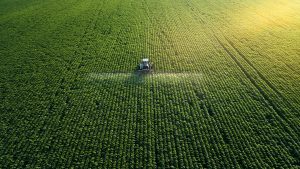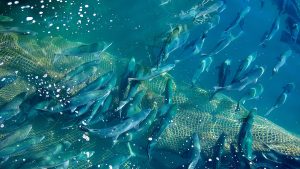The Regenerative Farming Accelerator has connected entrepreneurs in land and ocean farming, fostering innovation to tackle sustainability challenges. A year later, The Innovation Platform’s Maddie Hall interviewed CEO Harry Wright about its successes and future.
After observing the impact of agricultural runoff, nitrogen, and pollution from land farming on marine ecosystems, Bright Tide knew that action needed to be taken. Considering the potential applications of seaweed in replacing chemical fertilisers, the solution was to tackle both land and marine regenerative farming together.
In The Innovation Platform issue 19, we interviewed Harry Wright, CEO of Bright Tide, about their Regenerative Farming Accelerator Programme and its goals to support the UK agriculture and aquaculture sectors. Nearly a year later, The Innovation Platform’s Maddie Hall caught up with Bright Tide to discuss the programme’s successes and the exciting next steps for the organisation.
Reflecting on the past year, what progress has Bright Tide made with the Regenerative Farming Accelerator Programme, and can you share any specific success stories or measurable impacts you’ve observed in the ecosystems surrounding participating farms?
The Regenerative Farming Accelerator Programme has experienced an incredibly exciting and successful year. As the first accelerator to adopt a holistic approach, the programme supported entrepreneurs in both land and ocean farming.
Throughout the programme, we facilitated numerous connections for the entrepreneurs. For example, after a successful pitch event with Barclays, several participants were introduced to Barclays’ Eagle Labs ecosystem, their main platform for agri-tech founders. Additionally, one entrepreneur secured investment from a venture capital group involved in the programme, while Ficosterra, one of the seaweed companies, connected with a major food company and another with a major insurance company.
Barclays, along with Kennedys and Boatfolk, has been an excellent partner. Boatfolk, which manages key marinas across the UK, is particularly interested in running pilot projects with several startups involved in the programme and is currently in discussions with them.
Importantly, the programme was free for entrepreneurs, and many received pro bono legal support. Our legal partner, Hogan Lovells (HL BaSE), hosted an afternoon legal clinic that provided free legal advice by leading legal teams.
One of our main goals was to integrate the policy aspect into our discussions. To launch the programme, we held an event at Parliament attended by several Members of Parliament, and Kerry McCarthy, the Minister for Climate in the Department of Energy Security and Net Zero, spoke at the launch at Hogan Lovells’ offices.
This initiative took place under the previous Conservative Government, and we collaborated with the Conservative Environment Network to host a roundtable discussion with our entrepreneurs and seabed farmers. Notably, some of the recommendations from the entrepreneurs were incorporated into the Network’s environmental strategy. This was particularly exciting, as it created a direct connection between the challenges faced by entrepreneurs in the UK and how policy can address those issues. A significant focus was placed on the licensing and permitting processes for seabed farmers.
We aim to build on this success moving forward. As Sam Hall, the Director of the Conservative Environment Network, noted, “Several of the ideas that participants raised with us, particularly around simplifying the licensing process for marine restoration projects, made it into our CEN manifesto for this parliament.”
How has the landscape of sustainable agriculture evolved since you launched the programme, particularly regarding farmer participation and interest?
The past year has presented numerous challenges for farmers. National inheritance tax increases have impacted smallholder farmers, alongside cuts to the budget for nature-friendly farming. Additionally, various Environmental Land Management schemes, such as the Sustainable Farming Initiative (SFI), which once provided funding for farmers to adopt more regenerative practices, have been halted.
Economic instability and the unpredictability of global policies have also affected large food companies. It is common for major corporations to cut sustainability initiatives first during difficult financial times, and many seem to have shifted their focus away from regenerative goals.

During a recent roundtable discussion with Barclays and several regenerative farmers, many farmers emphasised the importance of biodiversity, while achieving net-zero emissions was less of a priority for them. Farmers have a long-standing tradition of sustainable practices and are eager to reduce their fertiliser use and overall environmental impact. However, rising fertiliser costs—especially due to the Russian invasion of Ukraine—have complicated their ability to manage expenses.
In light of your focus on biodiversity, can you discuss any new sustainable technologies or practices that emerged last year that have the potential to influence regenerative farming significantly?
As part of our efforts, last year we launched a programme dedicated to artificial intelligence and regenerative farming, in collaboration with Microsoft and EY. This initiative involves five AI companies exploring various applications, such as Flox AI, which is improving animal welfare in chicken farming through AI-driven data analytics and enhancing transparency in cotton supply chains, particularly in the UK and India, with a company called Materra.
Matterra is working with a clothing company to improve supply chain transparency by leveraging AI and data analytics. They are also collaborating with groups in Africa to provide microfinancing for smallholder farmers, using AI to offer valuable data insights that benefit farmers.
Recently, we completed our Sustain.AI programme, which supported ten AI entrepreneurs. Many of these entrepreneurs focused on projects such as biodiversity monitoring using acoustic sensing and utilising machine learning to identify species on farmland, while others concentrated on improving water irrigation management.
AI can help farmers predict weather variability, whether it pertains to droughts, wildfires, or flooding. By utilising AI, farmers can make informed decisions to improve yields and enhance forecasting. Additionally, there is synergy with large corporations that manage extensive value chains, which include suppliers and farmers at the grassroots level. AI can assist these corporations in consolidating data and obtaining necessary information from farmers to meet regulatory sustainability requirements, such as the Corporate Sustainability Reporting Directive (CSRD).
During the Sustain.AI programme, we encountered many fascinating businesses:
Wilder Sensing: This company has developed a device that can be placed on a gate or pole in a field, utilising bi-acoustic sensing to detect birds and other species. Through machine learning, it can identify these species, providing farmers with a tool to establish a baseline of biodiversity on their properties. It is also useful for compliance with biodiversity net gain legislation, which requires developers to demonstrate a 10% increase in biodiversity over a 30-year period.
Applied Genomics: Working with underwater environments, this company uses environmental DNA, taking and analysing small samples from the ocean to provide insights into the types of fish inhabiting that ecosystem. They are also employing artificial intelligence to create a data library for the UK, improving our understanding of underwater ecosystems.
SEABEX: SEABEX is assisting farmers in France and Tunisia, where drought is a significant issue. Their aim is to help these farmers better understand water scarcity and reduce their water usage. This initiative is particularly interesting from both a farming and climate perspective, as many farmers face challenges related to flooding and climate-related disasters.
Data management and artificial intelligence will be key focuses of our new programme, Agri Blue. AI, which aims to explore AI applications in both land and ocean farming. A significant challenge is that farmers are often cash-strapped and may be unwilling to pay for new tools. Therefore, it’s essential to examine the supply chain to understand why large companies would invest in AI tools and the benefits those tools would provide.
The central issue revolves around data management and the specific types of data needed to meet internal requirements. Last year posed challenges for venture capital (VC) financing, particularly in the Agritech sector. However, VC may not be the most suitable option for financing seaweed farmers specifically; alternatives like blended finance or debt financing might be more appropriate.
Have there been noteworthy developments in the aquaculture sector that align with the sustainable goals you’ve set for the Regenerative Farming Accelerator Programme?
Our entire new programme focuses on advancing regenerative farming/aquaculture, artificial intelligence, and technology. One company that has been performing exceptionally well is Pine Island Redfish, which participated in our regenerative farming programme. They are farming redfish in the Gulf of Mexico. Historically, there was a naturally occurring fish species there, and they are now working to restore that species through sustainable farming practices. The waste from their fish farm is used to grow mangroves in Pine Island, Florida. It’s an exciting initiative that revitalises an indigenous fish species while supporting the local economy and promoting sustainable seafood.
360 Aquaculture was also part of the Regenerative Farming Accelerator Programme and has successfully raised over £4.1m in Series A funding, including investments from well-known chefs. This funding is being used to create the first on-land facility for farming fish, corn, or shrimp in Wales. They are expanding the production of sustainably sourced prawns, aiming to supply sushi-grade prawns to the UK restaurant and hospitality sector.

Wildfarmed was also another participant in our programme. They collaborate with farmers across the UK to promote more sustainable farming practices, aiming to reduce pesticide use. Wildfarmed pays farmers a premium for their crops, then uses the flour to produce their own branded bread, which it sells at a premium in high-end supermarkets. This approach ensures transparency in the value chain, as supermarkets recognise the benefits of products grown in a more environmentally friendly manner.
How has the global conversation around food security shifted in the past year, and what role do you see regenerative farming playing in addressing these issues?
The changing geopolitical landscape has made the global food supply increasingly vulnerable, particularly in the UK. Ongoing crises and tariffs have contributed to a fragile global economy, leading us to become accustomed to various shocks.
One pressing concern is food resilience. How well-equipped is our infrastructure to handle another crisis? If we face another pandemic, what will our internal food security be? To what extent are we reliant on imported food compared to what we grow domestically? Coupled with these concerns are the risks posed by climate change, such as flooding, which incurs significant costs, and ongoing health issues like foot-and-mouth disease and avian flu, presenting a multitude of challenges.
Additionally, the UK is experiencing a notable decline in biodiversity; we are ranked among the ten most nature-depleted countries in the world, with 90% of our biodiversity existing in overseas territories, particularly around our oceans, where trawling also raises concerns.
Regenerative farming can help address many of these issues by fostering stability and resilience within our ecosystems.
Last year, we discussed the importance of education and raising awareness. Have you seen any developments in this area since then?
Education and awareness are crucial in the farming sector. The TV show ‘Clarkson’s Farm’ serves as a notable example of how to successfully raise public understanding of farming and the challenges that farmers face. In fact, our partner, Wildfarmed, was even featured on the show.
There is a significant need for increased education within Parliament, as many politicians discuss issues they do not fully understand, which ultimately harms farmers. Recently, there have been numerous farming protests regarding rising inheritance taxes. This situation underscores the opportunity for enhanced education and awareness around these topics.
One prominent event that supports this goal is the annual Regenerative Farming Groundswell Festival, this year held on the 2nd-3rd of July. Its popularity is growing, with many eager to learn more about these critical issues.
However, the challenge lies in making these ideas scalable and providing adequate support for farmers. We need to help farmers connect with investors and food markets. This is where the role of accelerators, like ours, becomes integral. By working within the policy, industry, and investment sectors, we can increase visibility and provide necessary support for startups in the industry.
Please note, this article will also appear in the 22nd edition of our quarterly publication.
Source link

